1. Key takeaways
- Any organization that operates online and collects data can benefit from a data analytics consultancy, from blockchain and IoT, to healthcare and financial services
- The market for data analytics globally was valued at $112.8 billion USD in 2023, and it’s projected to expand to $303 billion USD by 2030
- Cross-cloud connections and greater levels of AI-driven automation are two of the emerging trends we can expect to see more of in 2024
- A deep-dive into a company’s data can yield insights about customer buying patterns, reveal areas where internal processes can be automated, and even give companies an edge over competitors
- All data analytics projects follow the same 5 fundamental steps: Define project scope, collect raw data, clean and organize data, do the analysis, and present the findings
2. Introduction
With the growing availability of cloud and AI, the data collected by organizations is now worth its weight in gold. Large-scale, granular, and actionable data analytics is more accessible than ever, but it still comes with numerous challenges. Compliance, infrastructure development, data science — all of these require dedicated expertise. That’s where data analytics consultancies come into play.
This article is an all-encompassing guide for all things related to data analytics and consultancies. In it you’ll learn what big data consulting is and why it’s so highly sought-after by companies regardless of their industry. We’ll also examine the latest trends and what the future has in store for data analytics.
3. What is a data analytics consultancy?
Data analytics is the process of sorting through large datasets to make it readable, and then extracting valuable patterns and insights. A data analytics consultancy has a team of specialists and engineers who perform data analytics for companies that don’t have the capacity to do it in-house. Companies with in-house data capabilities can also engage consultancies to optimize costs, accelerate data engineering, find tech talent, and leverage outside perspectives and expertise.
How a data analytics consultancy works
The consultancy’s specialists empower companies to precisely, effectively, and efficiently utilize data for customer targeting, product development, automation, and more. Consultancies work with data and AI engineers, data scientists, business analysts, and software developers, enabling companies to turn data from a byproduct of doing business in the digital age to a business asset.
What you get by hiring a data analytics consultancy
- Access to specialized expertise without the delays and expenses associated with hiring in-house specialists
- A boost in efficiency through streamlining processes and leveraging expertise from diverse offshore and nearshore locations.
- Adaptability and scalability that come with consultancies being able to scale resources up or down as needed.
4. Big data consulting services
There’s a wide range of data analytics and other data-related services on the market. They differ from one data consultancy to the next, but here’s what you can generally expect.
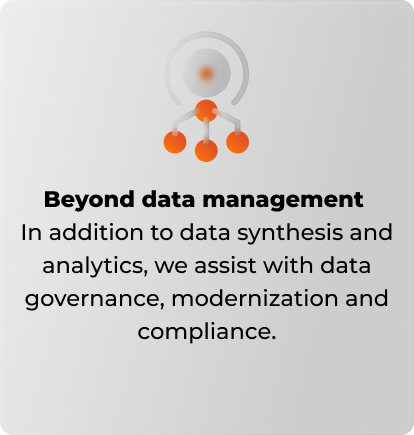
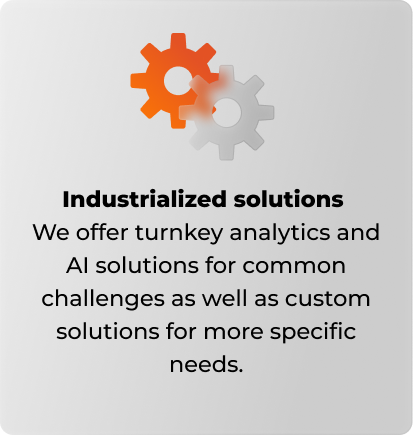
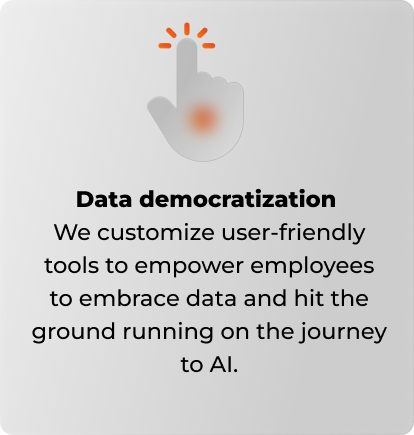
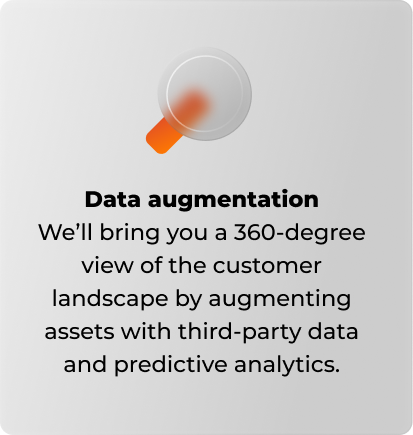
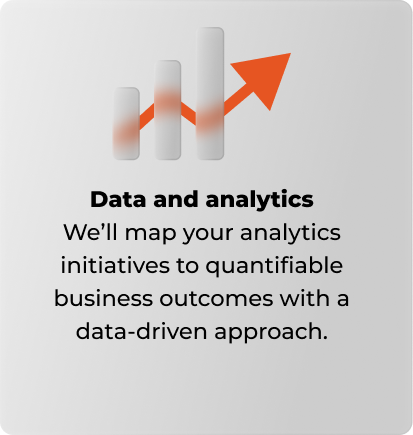
Data assessment and audits
Data assessment and audits enable consultants to identify opportunities for improvement, uncover risks, and recommend optimal strategies for data adoption, modernization, analytics, etc. Assessment and audits are essential to helping companies make smarter decisions based on facts, rather than a gut feeling.
Predictive modeling
Predictive modeling is a process used to anticipate future events by examining patterns in a given dataset. It’s a process that calculates current and past data to make the most accurate forecast possible.
Data management
Data management involves gathering, arranging, safeguarding, and storing an organization’s data to enable analysis to take place. In the face of organizations generating and utilizing data at unprecedented rates, data management solutions have become crucial for interpreting large quantities of data.
Data visualization
Many data analytics consultancy companies offer data visualization services that can help companies identify trends, patterns and anomalies using pie graphs, charts and other visual aids. Doing so is effective; some say our brains are hard-wired to quickly analyze and understand visualizations much quicker than reading text.
Data storytelling
Data storytelling is much like regular storytelling, but with the added benefit of walking the audience through a data “journey” — complemented with graphs and charts. This helps company higher-ups fully understand the findings and empowers them to make decisions quickly and with confidence.
Customer data platform consulting
A Customer Data Platform (CDP) is software that gathers information from various tools and creates a single, central database with details about every interaction customers have had with you. This database can then be utilized in many different ways to make more personalized marketing campaigns that resonate with customers.
Testing and personalization
Data analytics consultancies offer testing and personalization services that involve conducting experiments to optimize strategies, content, and user experiences. Through A/B testing, multivariate testing, and personalized content deployment, these services aim to enhance customer engagement and satisfaction while maximizing business outcomes.
Data and AI engineering
Analytics can only be as good as the technical infrastructure underlying it. Data consultancies provide engineering for the development of new and existing solutions. Integration with AI systems, the development of ELT and ETL pipelines, cloud migration, and engineering support are the typical services that fall into this category.
Monitoring and support
Monitoring is central to preventing AI analytics issues like model drift, ensuring compliance, and maintaining the high performance of data infrastructures. A consultancy firm can set up monitoring solutions, provide ongoing support for both technical solutions, and continually enhance a company’s data analytics capabilities.
Tap into top-1% tech talent with experts across 15+ strategic locations to boost product development by 2X at a fraction of the cost
4 types of data analysis
The four types of analytics found below form a continuum, with each stage building upon the previous one to extract more value from data. Organizations often use a combination of these analytics types to gain a comprehensive view of their data, and make changes to their customer engagements and internal operations.
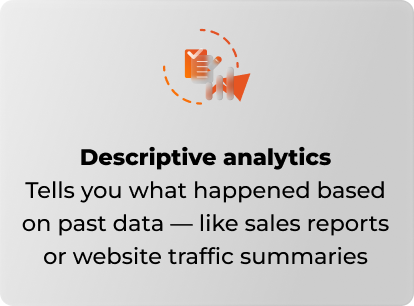
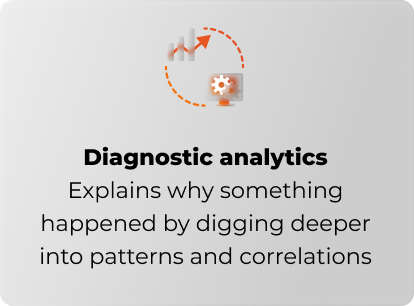
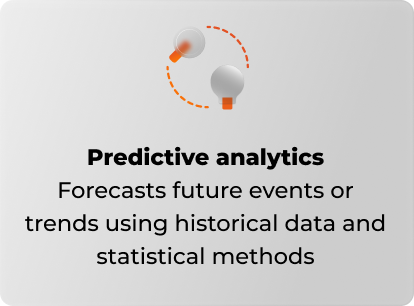
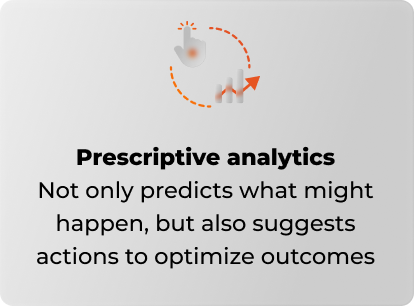
Descriptive analytics
Descriptive analytics summarizes historical data, describing what has happened in the past and providing a clear picture of events or patterns. This type of analytics uses techniques like data aggregation, data mining, and visualization to present data in a way that’s understandable and useful. Typical examples include sales reports, summaries of website traffic, or demographic data.
Diagnostic analytics
Diagnostic analytics dives deeper into data patterns to uncover the root causes of specific events. Once descriptive analytics reveals what happened, diagnostic analytics aims to explain why. This type of analysis relies on drill-downs, data segmentation, and correlation analysis to identify relationships and uncover the factors influencing certain outcomes. For instance, it might help a company figure out why sales decreased in a particular region, or why website traffic peaked during a specific period.
Predictive analytics
Predictive analytics focuses on forecasting future outcomes. It uses statistical algorithms, machine learning techniques, and modeling to make predictions about what might happen. Predictive analytics can estimate probabilities and trends, fostering informed decisions about potential future events. Examples include sales forecasting, predicting customer churn, or anticipating equipment failures.
Prescriptive analytics
Prescriptive analytics goes beyond predicting what might happen by pointing to a specific course of action to take. It leverages optimization algorithms, simulation, and machine learning to recommend actions that can maximize desired outcomes or minimize undesired ones. For instance, it might suggest optimal pricing strategies, inventory management plans, or treatment plans in healthcare.
Data analytics use cases by industry
Data analytics consulting is revolutionizing industries across the board, from healthcare to retail and financial services. Let’s take a closer look at how data analytics is being utilized in these sectors.
IoT
The Internet of Things (IoT) is a network of interconnected devices that autonomously collect and share data. IoT data analytics involves systematically gathering, analyzing, and interpreting the data generated by these devices. In heavy-duty industries like manufacturing, IoT sensors, coupled with analytics, can predict looming equipment failures or accidents.
Fintech
Fintech relies heavily on data analytics for fraud detection, risk assessment, personalized customer experiences, payments and the movement of money. Analytics models analyze transaction patterns to identify anomalies, detect fraudulent activities, and also provide financial products and services tailored to customer behavior.
Blockchain
Blockchain systems utilize analytics to process the vast amounts of data stored in distributed ledgers. Modern data and AI systems have gone a long way in helping companies verify transactions, improve transparency, track supply chains, and identify trends or patterns in cryptocurrency markets. Analytics also plays a critical role in ensuring the efficiency and security of blockchain-based solutions.
Healthcare
Healthcare organizations and health tech companies leverage data to improve patient outcomes, reduce costs, and manage resources and operations more efficiently. Analytics aids in areas like drug discovery, clinical research, and personalized medicine, where data is used to prescribe tailored treatments and optimize healthcare delivery.
Retail
In the retail sector, big data consulting provides businesses with granular insights into customer behaviors and buying patterns. Customer segmentation, demand forecasting, inventory optimization, and personalized marketing are the typical areas that rely on data analytics. Retailers analyze customer preferences to offer targeted promotions, optimize pricing, and improve customer experiences both online and in stores.
Travel and tourism
Data analytics enhances customer experiences in this industry by personalizing travel recommendations, predicting traveler preferences, and optimizing pricing strategies. It also helps with demand forecasting, route optimization, and understanding customer sentiment through social media analytics.
The data analytics process
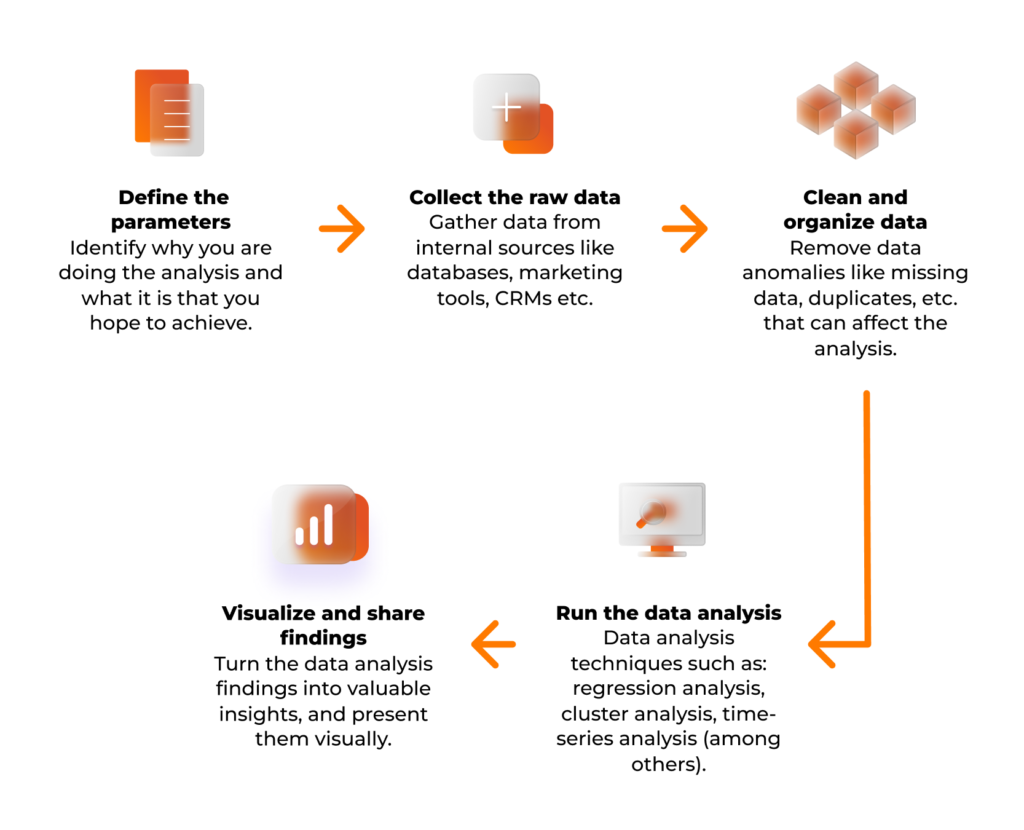
Data analytics is an iterative process that often involves refining steps as new insights or challenges arise, ensuring continuous improvement in the analysis techniques and outcomes. A data analytics process typically involves these steps:
1. Define the parameters:
- Identify the problem or objective: Clearly define what you want to achieve, determine the questions you seek to answer and the insights you hope to gain.
- Establish goals and metrics: Define the key performance indicators (KPIs) or metrics that will measure success in addressing the problem or achieving objectives.
2. Collect the raw data:
- Identify data sources: Determine where the relevant data resides. It could be databases, spreadsheets, APIs, IoT sensors, or other sources.
- Gather the data: Extract the necessary data from identified sources. This step involves data collection tools, APIs, or manual extraction processes.
3. Clean and organize data:
- Data cleaning: Remove duplicates, handle missing values, correct errors, and standardize formats to ensure data accuracy.
- Data integration: Combine data from various sources into a unified dataset, ensuring consistency and relevance.
- Data transformation: Prepare the data for analysis by formatting, aggregating, or structuring it appropriately.
4. Run the data analysis:
- Apply analytical techniques: Utilize statistical methods, machine learning algorithms, or other analytical approaches to extract insights from the prepared dataset.
- Explore and analyze: Dive into the data to identify patterns, correlations, outliers, and trends that provide answers to the defined problem or objectives.
5. Visualize and share findings:
- Data visualization: Present the analyzed data in graphical or visual formats (charts, graphs, dashboards) to make insights easily understandable.
- Interpretation and insights: Extract meaningful conclusions from the analysis and interpret them in the context of the initial problem or objectives.
- Communicate findings: Share the insights with stakeholders through reports, presentations, or interactive dashboards, ensuring clear and concise communication of the discovered insights and their implications.
3X better returns on your engineering spend. We match you with high-performing developers who drive efficiency and innovation from day one
Emerging trends
More free-flowing data across business ecosystems, greater levels of AI-driven automation and compliance software — these are a few of the big data consulting trends to look out for in 2024.
AI and automation:
- Augmented analytics: Augmented analytics platforms employ machine learning algorithms to automate insights, natural language processing for easier data interpretation, and automated data preparation, reducing manual efforts.
- AI-driven decision-making: Integrating AI into data analytics enables more intelligent decision-making. Predictive analytics, recommendation engines, and AI-driven insights provide businesses with proactive decision support systems, improving accuracy and efficiency.
- AI ops and automated data engineering: AI is utilized for automated data engineering, facilitating data ingestion, transformation, and modeling processes. AI ops ensures more efficient data pipelines and smoother data workflows, reducing human intervention.
Cross-cloud and hybrid cloud:
- Multi-cloud strategies: Consulting firms are increasingly focusing on enabling clients to seamlessly operate across multiple cloud platforms. This involves implementing strategies and architectures that allow businesses to leverage services from various cloud providers to optimize performance, cost, and flexibility.
- Hybrid cloud integration: Big data consulting firms are emphasizing the integration of on-premises and cloud-based infrastructures. Hybrid cloud solutions allow businesses to combine the benefits of both environments, ensuring security, scalability, and flexibility while managing sensitive data on-premises and leveraging the cloud for scalability.
Data governance:
- Focus on data privacy and compliance: With evolving regulations (like GDPR, CCPA), data governance in big data consulting is prioritizing data privacy and compliance. Firms are implementing robust policies and technologies to ensure data security and ethical use of data.
- Automated data quality and compliance tools: There’s a rising trend in using automated tools for ensuring data quality and compliance. These tools automate data profiling, validation, and monitoring processes, ensuring that data meets quality standards and regulatory requirements.
What to look for when hiring a data analytics consultancy
There are plenty of companies out there offering analytics and big data consulting. Inevitably, some of them will be better than others. This is why it’s important to do your homework before selecting a data analytics company. Here are a few things to consider.
Look into their past projects
Selecting a data consultancy requires an in-depth review of the consultancy’s track record. Thoroughly evaluate their historical projects, case studies, and client feedback.
Find out if they have an ethics policy
Working with data consultants often involves dealing with sensitive and confidential data, which means the consultancy must not divulge anything they see in the data. This might sound like a no-brainer, but some data analytics consultants are more scrupulous than others.
Look at their range of services offered
A comprehensive suite of services suggests a well-rounded understanding of data management, data analytics, and business intelligence. It also shows the company has a holistic view of big data consulting, and can likely handle any aspect of your data objectives.
Figure out how they are at communication
As with any leadership or consultancy position, communication is critical. Even if you have the right ideas and solutions, it will not be as effective if you cannot communicate them correctly to the team efficiently and timely.
Ask if they have experience in your industry
Another good idea is to find out if the data consultant has performed data analytics in your industry. Data analysis is not a one-size-fits-all field, so finding someone who understands the unique challenges and nuances of your industry is crucial.
Conclusion
Data is abundant in every modern business and highly valuable, so much so that it’s been called “the new oil.” And just like oil, data’s value is only revealed when it is refined.
This value of data analytics is reflected in how fast the market is growing. The size of the data analytics market worldwide is estimated to be around $112.8 billion USD in 2023. It is projected to balloon to around $303 billion USD by 2030.
If your business has been considering a big data consultancy but hasn’t yet pulled the trigger, then 2024 may be the right time. You must assume that your competitors are leveraging the power of data analytics, and to delay any longer, your company risks falling behind.
Data Studio from AgileEngine offers a wide array of proven data analytics consulting services, including:
- Performance optimization
- Data engineering
- Data visualization
- Data science and machine learning













